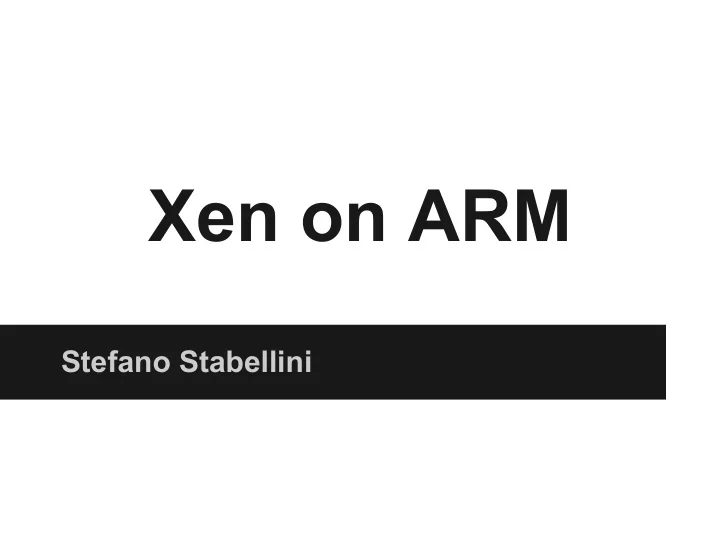

Xen on ARM Stefano Stabellini
Virtualization: why it matters
Xen: the gears of the cloud ● large user base more than 10 million individuals users ● power the largest clouds in production ● not just for servers
Xen: Open Source GPLv2 with DCO (like Linux) Diverse contributor community
Xen: Open Source source: Mike Day http://code.ncultra.org
Xen Architecture Dom0 DomU DomU DomU PV backends PV Frontends PV Frontends PV Frontends HW drivers Xen Hardware
Xen Architecture: driver domains Disk Driver Network Dom0 DomU Domain Driver Domain BlockBack NetBack BlockFront Toolstack Disk Driver Network Driver NetFront Xen Hardware
Xen: advantages ● small surface of attack ● isolation ● resilience ● specialized algorithms (scheduler)
Xen Architecture: HVM guests Dom0 HVM DomU stubdom HVM DomU IO emulation IO emulation QEMU PV Frontends PV backends HW drivers Xen Hardware
Xen upstream status ● Xen (Dom0 and DomU support, PV frontends and backends) fully upstream in Linux since v3.0 A single 3.0.0 Linux kernel image boots on native, on Xen as domU, as dom0 and PV on HVM guest ● Xen upstream in QEMU since v1.3 ● Xen supported by SuSE, Debian, Ubuntu, Fedora, CentOS, NetBSD and more
ARM Servers coming to market 4GB RAM, 4 cores per node 3 x 6 x 4 x 4 = 288 cores single node virtualization - manageability -
Design goals ● exploit the hardware as much as possible ● one type of guest ● Rearchitected for the modern age: ○ no QEMU ○ no compat code ○ no shadow pagetables ○ no PV MMU hypercalls
Xen on ARM architecture
Xen on ARM architecture
Exploit the hardware Exploit the hardware virtualization extensions support as much as possible: ● hypervisor mode ● MMU: second stage translation ○ no PV MMU calls ○ no shadow pagetables: -10721 lines of code!! ● hypercall: HVC ● generic timers
General Interrupt Controller an interrupt controller with virtualization support ● use the GIC to inject hardware interrupts into dom0 ● use the GIC to inject event notifications into any guest domains with Xen support ○ use PPI 31 ○ advertise the IRQ via Device Tree
One type of guest to rule them all
One type of guest Like PV guests do it: ● support booting from a supplied kernel ● no emulated devices ● use PV interfaces for IO no need for QEMU
One type of guest Like HVM guests do it: ● exploit HW nested paging ● same entry point on native and on Xen ● use Device Tree to discover Xen presence ● no unnecessary devices in the Device Tree ● simple device emulation can be done in Xen no need for QEMU
The hypercall calling convention the hypercall interface: ● hvc instruction ● hypervisor specific imm 0xEA1 ● hypercall arguments passed in registers
Device Tree Use Device Tree to describe the virtual platform hypervisor { compatible = "xen,xen", "xen,xen-4.2"; reg = <0xb0000000 0x20000>; interrupts = <1 15 0xf08>; };
Device Tree Use Device Tree to describe the virtual platform version of the Xen ABI hypervisor { compatible = "xen,xen", "xen,xen-4.2"; reg = <0xb0000000 0x20000>; interrupts = <1 15 0xf08>; }; Grant table memory area event notifications IRQ
a 64 bit "ready" ABI ● a single hypercall ABI for 32 bit guests and 64 bit guests no compat code in Xen ○ 2600 lines of code lighter
ARMv8 ● Builds on foundations laid by ARMv7 ○ xen/arch/arm mostly common code ● Initially 32 bit dom0+domU on 64 ○ Kernels already ready ○ 64-bit guest support in progress
Code size sometimes smaller is better Common ARMv7 ARMv8 Total xen/arch/arm 5,122 1,969 821 7,912 C 5,023 406 344 5,773 ASM 99 1,563 477 2,139 xen/include/asm-arm 2,315 563 666 3,544 TOTAL 7,437 2,532 1,487 11,456 ● Entire hypervisor ~200,000LOC ○ X86 (64-bit only) ~100,000LOC (~4,000 ASM) ■ ~22,000: HVM. ~14,000 MMU
Challenges From the emulator to real hardware:
War Stories Challenges From the emulator to real hardware: ● barriers and flushes ● cache coherency ● GIC and race conditions ● virt_timer documentation bugs
Porting Xen to a new board ● Xen only relies on GIC and GT ● platform specific code in Xen is reduced to: ○ secondary cpus bring up ○ UART drivers ○ any platform specific bootup quirks (ideally none)
Status of the Project: ARMv7 ● Xen and Dom0 booting on Versatile Express Cortex A15 and Arndale ● XL (Xen toolstack) ported to ARM ● PV console, disk and network working ● basic VM lifecycle operations functional ● Xen and Linux ARM patches fully upstream
Status of the Project: ARMv8 ● Xen booting 64 bit ● Dom0 32 bit boots on Xen 64 bit ● 32 bit guest creation and destruction ● Shared code means most features developed on ARMv7 Just Work
Roadmap Xen 4.3 ○ ARMv7 (VExpress and Arndale) fully supported ○ ARMv8 64-bit port of the hypervisor Xen 4.4 ○ increase HCL ○ automated testing ○ ARMv8 64-bit virtual machines and tools ○ PCI passthrough, live migration Linux 3.11/3.12 ○ full ARMv8 64-bit Xen guest support
Demo
More Information ● http://www.xen.org ● Xen on ARM @wiki.xen.org: goo.gl/FKNXe ● http://lists.xen.org/mailman/listinfo/xen-devel
Recommend
More recommend